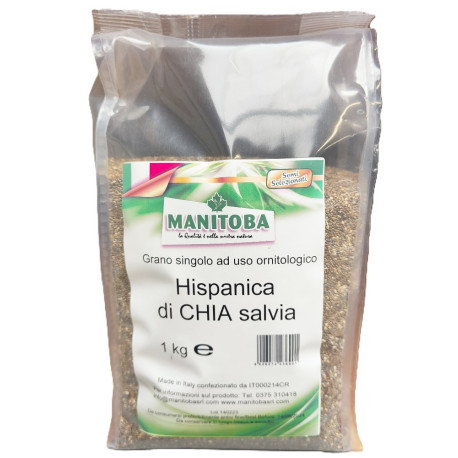





Reference: 3690/S
Chia is sage. It is an annual plant up to 1 m tall whose scientific name is Salvia hispanica.
The composition of chia seed closely resembles that of other mucilaginous seeds such as flaxseeds and psyllium. Unlike flaxseed, however, chia does not have anti-nutritional factors, factors that limit the use of flaxseed without prior hot treatment. Anti-nutritional factors are cyanogenic glycosides or linatins, inhibitors of vitamin B6 that prevent its action. Chia also has a much more pleasant taste than flaxseed and birds consume it more willingly.
Chia is sage. It is an annual plant up to 1 m tall whose scientific name is Salvia hispanica.
The composition of chia seed closely resembles that of other mucilaginous seeds such as flaxseeds and psyllium. Unlike flaxseed, however, chia does not have anti-nutritional factors, factors that limit the use of flaxseed without prior hot treatment. Anti-nutritional factors are cyanogenic glycosides or linatins, inhibitors of vitamin B6 that prevent its action. Chia also has a much more pleasant taste than flaxseed and birds consume it more willingly.
Chia sage seeds are rich in flavonols (myricetol, quercetol, kaempferol), flavonol glycosides, chlorogenic acids, and caffeic acid.
They are rich in protein and fiber. With a rate, admittedly variable, ranging from 16 to 23% of protein, they are above wheat (14.7%) and corn (14%). They are also very rich in lipids containing a high proportion of omega-3 acid (alpha-linolenic acid represents 68% of lipids or 21% of the total) and a favorable omega-3 to omega-6 ratio of around 3-4.
Strong points: Chia seeds provide a good source of calcium and phosphorus and a very good source of dietary fiber and manganese.
Chia has good antioxidant activity provided by its polyphenols (chlorogenic acids, caffeic acids and flavonols).
Premium high-quality, high-fat seeds
- With a high content of vitamin E, B9, B5, B6, B1, B2, B3 and vitamin K.
- It has antioxidant properties.
- Excellent energy contribution.
- Rich in calcium, potassium, magnesium, phosphorus, protein, zinc, thiamine, pectin (cleanses the body).
Improves liver and overall health of birds.
Suitable for a wide range of birds, including parrots, canaries, budgerigars, and other exotic birds.
Benefits for birds:
- Liver support.
- Detoxification: Helps eliminate toxins from the liver and improves digestion.
- Strengthening the immune system.
Instructions for use:
Dosage: Add a small amount (usually a teaspoon per day) to the birds' usual seeds. The amount may vary depending on the size and specific needs of the birds. Can be mixed with the birds' daily food.
Precautions:
Store in a cool, dry place, away from moisture and direct sunlight.
The canary seed is a grass, an annual plant up to 1m tall, the seeds being found in the inflorescences. These seeds represent a significant fraction of the majority of bird mixtures.
• Excellent for canaries, European and exotic birds, wavy parakeets and large parakeets.
• EXTRA canary seed has undergone extra cleaning and is of exceptional quality. Unique on the market!
Chicory seeds (cichorium intybus) are among the health seeds that come from wild plants. These seeds are rich in fiber and minerals and allow intestinal balance.
They purify the body and are also effective in case of indigestion.
Seeds for canaries and exotic and native birds.
Clover stimulates the immune system and slows down cellular ageing through its excellent antioxidant properties. Rich in vitamins B, C, E and provitamin A.
These seeds rich in fat and protein are especially appreciated by wild birds. They will attract sizerins, finches, goldfinches, black-capped, sparrows, mourning doves and a host of other birds to your garden. It is often used as a replacement for the shuttle, which is more expensive.
The sunflower seed contains nearly 40% lipids, but also proteins, carbohydrates, and vitamins B and E. A sunflower seed contains approximately 600 kilocalories per 100 g.
It meets the needs of a wide variety of birds throughout the year, including the smallest among them.
Sunflower seeds are a real treat for our birds who love them!
Oatmeal or peeled oats are used in the composition of the basic mixtures of canaries and hooked beaks especially during the breeding and feeding period.
Its protein level is quite low, but it is a seed rich in energy.
Crude protein: 13%
Fat: 8%
Carbohydrates: 68%
Phosphorus: 0.4%
Calcium: 0.09%
Millet is used in the diet of all birds: straight beaks and hooked beaks. In bunches, it's a treat they love.
Cluster millet has a good protein and carbohydrate content and also contains a large number of amino acids. Ideal for distracting your birds and thus avoiding pecking (feather pulling).
The thistle-Marie seed has hepatoprotective properties. It is therefore excellent for our birds to avoid liver problems as a preventive measure.

Chia is sage. It is an annual plant up to 1 m tall whose scientific name is Salvia hispanica.
The composition of chia seed closely resembles that of other mucilaginous seeds such as flaxseeds and psyllium. Unlike flaxseed, however, chia does not have anti-nutritional factors, factors that limit the use of flaxseed without prior hot treatment. Anti-nutritional factors are cyanogenic glycosides or linatins, inhibitors of vitamin B6 that prevent its action. Chia also has a much more pleasant taste than flaxseed and birds consume it more willingly.
